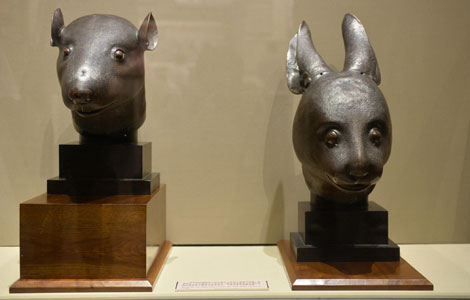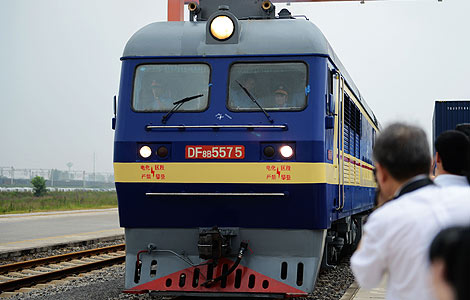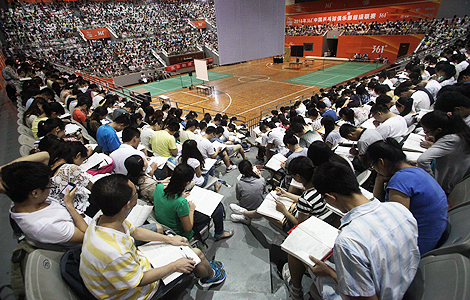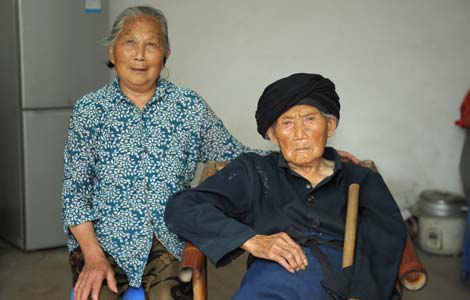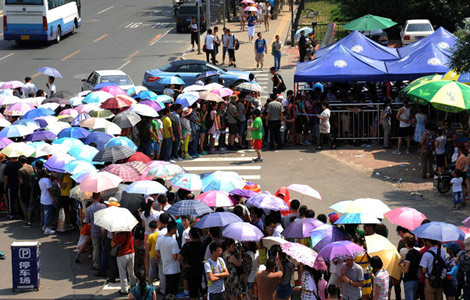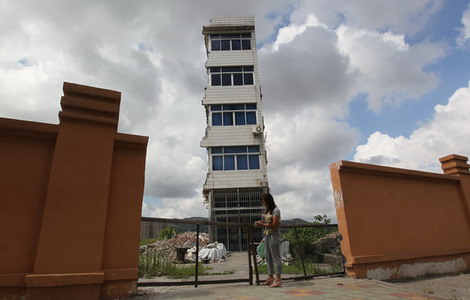

Problems with labor and materials are pushing Chinese producers of festive goods to the brink. Gao Qihui reports from Shantou.
Christmas is "the most wonderful time of the year", sings crooner Andy Williams in his 1963 hit. Many Chinese manufacturers used to agree - not any more.
After a year of coping with labor shortages, price hikes for raw materials and an appreciation of the renminbi, many companies that make yuletide products are now considering pulling out of the industry.
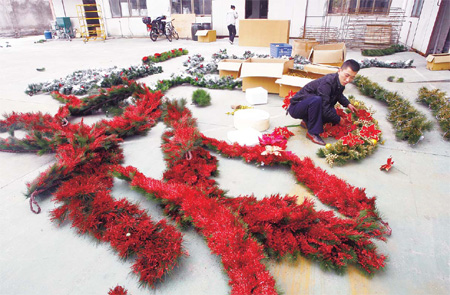 A worker arranges tinsel and other yuletide products at the Youlide Arts and Crafts factory in Yiwu, Zhejiang province, on Nov 18. Almost 60 percent of the world's Christmas products come from China, however many manufactures are considering pulling out of the business because of shortages in labor and increases in the costs of raw materials, like non-woven fabrics. Provided to China Daily |
Almost 60 percent of the world's Christmas products come from China. Yet, while toymakers record healthy profits, factories producing decorations and ornaments say they are struggling.
"If the situation does not improve, we'll definitely want to quit (production)," said Cai Qichang, owner of an arts and crafts company in Shantou, Guangdong province. "The sun is setting on the Christmas product industry (in China) right now."
Exports of festive products from the province actually hit $770 million between January and October 2010, a 3.9-percent year-on-year rise, according to official data.
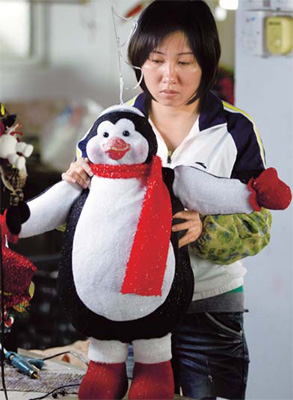 An employee at Jiaying Arts and Crafts factory in Shantou, Guangdong province, finishes work on a Christmas decoration. Zou Zhongpin / China Daily |
Roughly 48 percent of all Christmas products exported by China in the first 10 months of this year were made in Guangdong.
"Orders for our hand-crafted Christmas ornaments, dolls and other works did increase slightly this year," said Huang Shaokuang, sales manager at Jiaying Arts and Crafts in Shantou's northern Chenghai district, which is home to more than 3,000 producers.
Yet, despite generating almost 8 million yuan ($1.2 million) in sales, as of October, the company had made no profit.
"Still, we have fulfilled our social duty of feeding our workforce of more than 80 people," said Huang, forcing a smile.
Factories across Chenghai have reported similar experiences, with "many actually running at a loss", added Cai, who is also chairman of the Chenghai Arts and Crafts Association, which is made up of more than 100 small and medium-sized enterprises.
Rising expenses
Profit margins for factories making Christmas products are already paper-thin, ranging from just 2 to 5 percent, according to a recent report by Xinhua News Agency that quoted an unnamed expert with the Chinese Chamber of Commerce for Imports and Exports of Light Industrial Products and Arts and Crafts.
Things have only been made worse by sharp rises in the cost of labor and raw materials.
Take non-woven fabric, the most common material used in festive ornaments and dolls, prices soared from about 8,000 yuan a ton in January to more than 16,000 yuan a ton in October.
"With raw materials making up at least 40 percent of our gross costs, I dare not purchase any non-woven fabric right now. I'm waiting for the price to drop," said Huang, whose company has been producing yuletide ornaments for 18 years.
Many traders are instead looking to buy from manufacturers in East China's Zhejiang province, where supplies are cheaper.
"We're now less competitive, as Shantou is not a source of raw materials," complained Chen Shaoyan, owner of Zheng Chang Long Carton Factory, which has been making yuletide ornaments for 10 years.
However, even in Zhejiang, the so-called "home of fabrics", plants have witnessed staggering price hikes for core ingredients in their products.
"Our gross costs have increased by about 25 percent," said Huang Jili, general manager of Orient Crafts in Ningbo, a city on the province's east coast. "We are feeling the same pressures."
Although the price of raw materials is likely to fall, analysts predict companies will have to deal with labor shortages and rising salary demands for some time to come.
Factories across the Yangtze River and Pearl River deltas - China's two economic powerhouses - have been short on hands since March this year, following the national Spring Festival holidays.
In response, at least 14 provinces and municipalities have raised the minimum wage, including both Guangdong and Zhejiang.
"If my production line is running at full capacity, we need at least 800 workers," said Chen in Shantou. "This year, I had only 200 workers during the peak time."
He said the situation forced his company to reject several orders from clients, resulting in sales falling 30 percent.
"Some manufacturers finished the orders at a loss to maintain the operation and keep their workers," added Chen.
Luo Yonghuang, deputy general manager of Hongfeng Arts and Crafts in Meizhou, Guangdong, complained that even though he raised his workers' wages by 150 percent, the company still experienced a labor shortage.
As most Christmas products are assembled by hand, the industry is extremely reliant on human resources, and a shift toward mechanized operations would be economically unfeasible for most.
